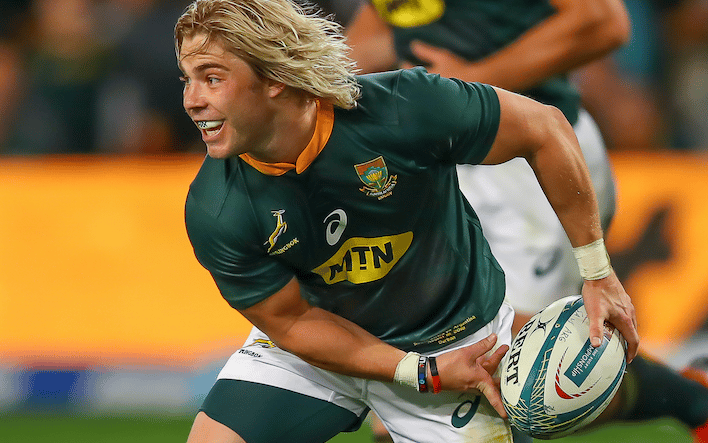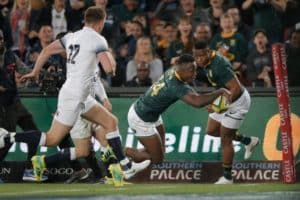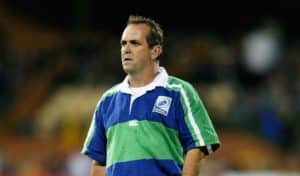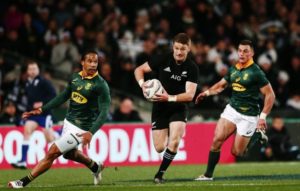The Springboks still have a lot to rectify and address in the 12 months leading up to the 2019 World Cup, writes JON CARDINELLI.
The Boks will face the All Blacks in the first match of their 2019 World Cup campaign in exactly one year’s time. By the end of that clash in Yokohama, we will know which team is likely to top Pool B and secure an easier path to the semi-finals.
One cannot see Italy, Namibia or the winner of repechage tournament finishing above New Zealand or South Africa in the pool standings. Then again, few if any would have bet on Italy to beat the Boks in Florence in 2016, or the Boks to down the All Blacks in Wellington this past weekend.
Complacency has compromised many a team in a one-off Test, and at the World Cup itself. Just ask the Bok players and coaches who lost to Japan at the 2015 tournament.
Rassie Erasmus’ side cannot afford to underestimate a single team at the 2019 competition. In one sense, the Boks are fortunate in that their toughest pool clash is up first. They will have no choice but to lay everything on the line from the outset.
On the other hand, they will have little opportunity to acclimatise to the Japanese conditions before a potentially campaign-defining pool clash against the All Blacks.
Their pre-tournament preparations will need to be spot on. Erasmus and company will have to do everything in their power to ensure every box is well and truly ticked.
BUILD ON BELIEF
Which team benefited from the result in Wellington as far as the 2019 World Cup showdown is concerned?
The Boks, the All Blacks, or both?
The All Blacks needed a big loss in the lead-up to the tournament. Considering all their achievements over the past nine years, disappointments don’t come any bigger than a defeat on home soil.
It was in that match against the Boks where their defence and goal-kicking – aspects of their game that have been sub-standard for some time – were exposed. Expect coach Steve Hansen and his lieutenants to address these issues over the next 12 months.
No matter how you look at it, the Boks desperately needed the win in Wellington. They’ve ended the nine-year drought in New Zealand, and they’ve given supporters and stakeholders reason to be patient as they build towards the World Cup.
In the context of that tournament and the clash with the All Blacks on 21 September 2019, the South African players now know what it takes to beat the New Zealanders.
A narrow loss last week would have been praised, as many expected a one-sided rout. The Boks held on for the win, however, and will have reason to go into the World Cup clash with some confidence.
That said, that confidence will take a knock over the next 12 months if the Boks don’t set the record straight against some of the other teams. They will host the Wallabies in Port Elizabeth next week, and a defeat – their first to Australia on home soil since 2011 – would bring them crashing down to earth.
The tour to the northern hemisphere in November will be a big one in terms of results and team management. The clash against England will be hyped up, and a win at Twickenham could serve as a statement given England’s position on the world rankings.
The Boks would do well to take the games against Scotland and Wales seriously. If they manage to beat the All Blacks in the Pool B clash next September, and Ireland finish ahead of Scotland in Pool A, then the Boks will face Scotland in the quarter-finals.
As for Wales, the Boks haven’t downed the Dragons in Cardiff since 2013, and will be looking to bounce back against a side they’ve beaten only once in the last five meetings.
WATCH: Bok win will build belief
PLAYER MANAGEMENT AND TRANSFORMATION
The Boks will play 10 Tests before the game against the All Blacks in Yokohama. That may sound like a few with regards to experimentation and, eventually, settling on a preferred combination.
One also needs to bear in mind, however, that some of the players will be involved extensively in club competitions in Europe, Japan and South Africa before the global showpiece. There’s a lot of rugby still to be played, and a lot can happen with regards to injuries.
At this point, the Boks lack experience across the board. While there is a lot of debate about who should start in the loose trio and which flyhalf – Handré Pollard or Elton Jantjies – is the better bet, people tend to forget that Erasmus doesn’t have as many quality options at scrumhalf, in the midfield, and at fullback.
When the 2018 season commenced, Erasmus made it clear that Faf de Klerk was the first-choice No 9. Ross Cronjé has battled to make the step up in the past year or so, and we’re yet to see rookies like Ivan van Zyl or Embrose Papier enjoy an extended opportunity. Indeed, we’re yet to see either of the younger scrumhalves taking control at Super Rugby or Currie Cup level and really giving Erasmus food for thought.
Warrick Gelant will come into the fullback conversation over the next few months, as will Damian Willemse, who is being groomed as a utility option ahead of the World Cup. A year out from the tournament, however, and we can’t say with any certainty who should join De Klerk in the scrumhalf contingent, and even who could fill the void if De Klerk was forced to miss the tournament altogether.
Some griped about the relative dearth of black players in the starting team when the Boks faced the All Blacks in Wellington. Some even made the point that when the side is struggling and the coach is fighting to keep his job, transformation targets tend to be neglected.
Erasmus did a great job in this department during the early stages of his tenure. However, it remains to be seen if he will back black players in the big games at the World Cup next year, and whether we will witness a side that is 50% black and 50% white in a playoff match.
KICKING THE HABIT
Under Erasmus, the Boks have played a more attacking brand of rugby and the manner in which they have put sides like England and New Zealand under pressure should be commended. That said, defence and excellent goal-kicking win World Cups, and Erasmus and company would do well to remember the fact.
The Boks have work to do with regards to their defensive plan and kicking strategy ahead of the global tournament. Their efforts in Wellington last week were nothing short of heroic, but on another day against the All Blacks – or any other top side, for that matter – they would have been punished for their tactical and defensive mismanagement.
It’s tempting to focus on the final stages of the game in Wellington and declare the defence a strong point. Indeed, there may a come a time down the line when the players remember that passage of play and use the memory to inspire them. The standard in that regard has been set. It was gladiatorial.
However, there’s no getting away from the fact that the Boks conceded six tries and 34 points across the 80 minutes. They missed 39 tackles in that match, and their inability to match the All Blacks’ kicking game forced them to spend much of the contest pinned in their own half.
Pollard had a great day as far as goal-kicking was concerned, and some have suggested that he answered the critics who lambasted him for his wayward showings against Argentina. When one considers the performances of the past three years, though, one understands that the issues run deep and a kicking coach needs to be added to the management team sooner rather than later.
Indeed, ask Jonny Wilkinson if he won the 2003 World Cup on his own. Even the most talented kickers need guidance, and as we’ve seen, tactical kicking can shape a match and an accurate goal- or drop-kick can be the difference between winning a tournament and finishing as also-rans.
ADAPTING TO CONDITIONS
Japan has experienced hot and humid weather in recent months. Duane Vermeulen, who is currently playing in the Far East, as well as Eddie Jones, who coached Suntory Sungoliath for many years as well as the Japanese national side, have made the point that the 2019 World Cup will be like no other global tournament before it due to the unique conditions.
Will Erasmus factor this into his preparations? Will other big teams like the All Blacks, Wallabies, or even the northern hemisphere giants who play most of their rugby in cold and heavy underfoot conditions?
Getting the Boks fit was one of Erasmus’ biggest priorities when he was first appointed this year. Getting the team fit for a tournament in Japan, however, could be an entirely different story.
One would hope that the South Africa-based players are managed carefully during the 2019 Super Rugby tournament. Erasmus will have no control over players plying their trade in the European club tournaments, though – De Klerk and Willie le Roux, among others – and this is yet another reason why he will need to develop some depth in the scrumhalf and fullback positions sooner rather than later.
COLUMN: Wellington win will be Bok catalyst
Photo: Steve Diamond/Gallo Images





